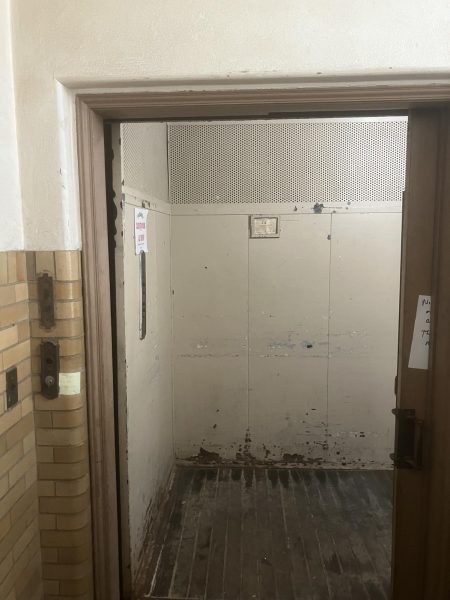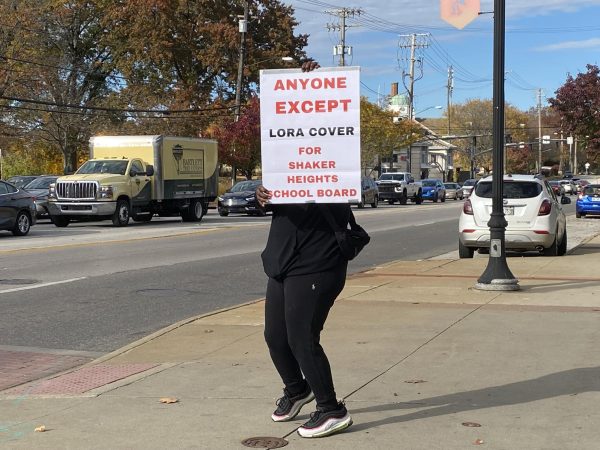New Year, New Tardy Policy
The high school looks to minimize tardies with a brand new policy, generating mixed reviews from students and faculty.
The first floor of Shaker Heights High School right before the second period late bell Aug. 28, 2015. This was the first day the new tardy policy was enforced.
Apparently, more than 100,000 tardies were enough.
With more than 50,000 tardies reported in each of the last two years according to Assistant Principal Sara Chengelis, the administration has established a new system to reduce tardiness. The policy was put into effect on Aug. 21, after four days of school.
Although administrators would not provide an official number of tardies issued on the first day that the policy was enforced, Chengelis reported 25 and administrative assistant Betsy Murray reported 30.
The new policy states that classroom doors will be locked after the second bell rings. If students show up late, they must visit one of two tardy slip stations, located on the first and second floor, and receive a green pass. Students are then given five minutes to return to class in order to- avoid an unexcused absence. Students who are legitimately late — because of finishing a test, for example — will be issued pink passes to differentiate from those who are unexcused. After acquiring five unexcused tardies, students will receive an extended study detention after school. After 10 unexcused tardies, they will receive an in-school suspension.
Last year’s policy stated that students who showed up 1-14 minutes late to class would be considered tardy and after 15 minutes they would be considered absent. It was the teacher’s responsibility to handle tardies and report to parents if students accumulated 2-3 tardies. If the tardiness continued, after school detentions would be given to the students.
So far, students seem to be taking the policy seriously. Teachers have reported seeing students walking quickly through the halls to avoid being late, and after the second-period tardy bell Aug. 21, no students were seen at either pass station.
Junior Margaret Cook is skeptical of the new system, however. “The pass station will not work because I think it will just take more time and cause more chaos to have to walk all the way to [Room] 110 before returning to the class you were late to in the first place.”
“Making kids miss more school isn’t going to solve any problems,” agreed sophomore Conor Smith.
“We are not trying to give out consequences,” Assistant Principal Sara Chengelis said during a start-of-the-year assembly, “too many problems happen during passing periods in the hall.”
Science teacher and IB MYP Coordinator John Moore said that teachers have been “disappointed in hallway behavior and tardies. So these new policies are a response to some of our major concerns.”
Global studies teacher Roy Isaacs said that teachers responded positively to the change when informed during a meeting Aug. 18. “When the new policy was announced, there was excitement, even cheers,” he said.
However, Isaacs does not share in the excitement. “I feel that education should be voluntary. It is a privilege. I think it’s a good thing that this country can afford education for all but if we’re forcing it, that counters to the reason education is here in the first place,” he said.
Security guard Mark Seymore expressed optimism about the policy’s potential. “I think [students] are going to respond in a more positive way because I think it’s going to help them as far as their grades are concerned,” he said.
Students, however, are not as hopeful.
“Honestly, people who are going to be late are going to be late,” said senior Amani Hill. “The people who are going to be persuaded to arrive on time will be the ones who only are late when they know it won’t be a problem. They’ll get to class on time just to walk in and ask to leave for the bathroom or their locker anyway.”
Senior Sloane Stack agreed. “I think it’ll encourage them not to come to class at all since they’re already locked out,” he said.
Government teacher Tod Torrence said the policy’s success hinges on follow through.
“Some kids will try to push the bubble, to see whether or not this tardy stuff will actually work and last. The consequences need to be immediate,” Torrence said.
Several teachers emphasized the importance of a uniform approach.
Economics teacher Bryan Elsaesser said that with the policy, “you don’t have other teachers having different policies… it creates consistency, which is a really good thing for a school.”
English teacher James Casale also noted the importance of consistency. “I think it will be effective if all the teachers are consistent with the policy,” he said.
“I think attendance is one of the hardest things to deal with and maintain,” said English teacher Sharon Craig, “it is not effective unless everyone does their part.”
Journalism One students and Campus and City Investigative Reporter Audie Lorenzo contributed to reporting.






